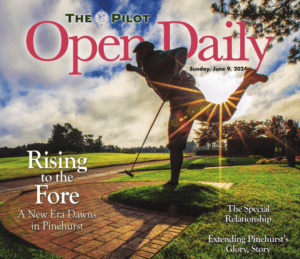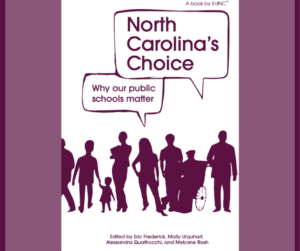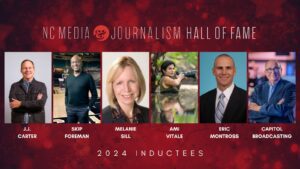Check out the full NC Local newsletter from March 10, including a preview of the NC Open Government Coalition’s 2021 Sunshine Day program, leadership transitions at The Daily Tar Heel and Scalawag, job opportunities and some recent standout local journalism
By Eric Frederick, NC Local newsletter editor
Pacing his apartment as the pandemic got real last spring, Kyle Villemain recalls, he thought a lot about something he’d long considered — that local media needed “to go deep on North Carolina.” As long days of rumination passed, he decided he’d have a go at it himself.


Nine months of intense conversation with media and thought leaders led to The Assembly, launched last month as a statewide digital magazine and billed as a place “for stories that aren’t being told — and for those that deserve a deeper look” and one “focused on deep long-form reporting and smart ideas writing.”
After growing up in Carrboro and graduating from UNC in 2015, Villemain, 28, was deputy finance director for a congressional campaign in New Hampshire and then worked as a speechwriter for UNC chancellor Carol Folt and UNC system president Margaret Spellings. After Spellings left UNC in early 2019, Villemain wrote speeches as a freelancer while contemplating what he saw lacking in the state’s news and information landscape.
What he saw, he told me, was a lot of good work but also “how much is going on underneath the surface and how much, if you’re not in the room, you’re not quite privy to what’s happening — and we need more journalism that tries to put people into the room.”
The goal, he says in his introductory piece on the Assembly site, is to redirect some of North Carolinians’ attention to a serious dialogue about the state’s politics, education, media, environment, business and arts. He says he’s emphasizing diversity — in political voices and in the backgrounds of the freelance writers and creatives who will do the work. The name, he says, is “a reference to the act of assembling a state through its disparate parts: people, ideas, and institutions.”
Villemain told me he plans to roll out five to seven long-form stories per month and several more short-form pieces — what he calls “smart ideas writing.” Long-form topics so far include the motivations of state Senate leader Phil Berger, Cecil Staton’s ill-fated tenure as ECU chancellor, and the “historical erasure” of the Black experience in Tarboro and Edgecombe County. There’s also a twice-weekly newsletter.
The Assembly is a C corporation, supported for now by subscribers (as little as $3 a month) and investors. Non-subscribers can read one free story per month. Advertising will play a small role, Villemain told me.
The Assembly is featured in today’s NC Local newsletter. Here’s more of our conversation, edited for length and clarity:
Tell me how you got to this point.
I’m a Carolina grad, Class of 2015. I worked in politics for a little bit up in New Hampshire, on a congressional race, and ended up coming back down to Chapel Hill, worked for Carol Folt as a speechwriter at UNC-Chapel Hill, and then for Margaret Spellings at the system office. And I think both experiences gave me a bit of a lens into how statewide institutions work, and don’t work. … They were making good choices and bad choices, but almost across the board, their choices were undercovered and underexamined. After Margaret left, I was a freelance speechwriter for a while. I kept working for higher ed and nonprofit institutions, but I was driven to create The Assembly because I wanted to create an outlet that was diving deep into these statewide institutions, leaders, people, ideas, to do some more of that enterprise coverage and long-form coverage that I felt was missing when I was working on the institutional side.
That unmet need you’re trying to fill — say more about that.
I would say we have an underleveraged asset. We have so many great writers in this state who are not on staff at outlets, right? They are academics, they’re journalism professors, they are novelists and authors, they’re former journalists. And what we need is a place to focus their energy on North Carolina. It’s a hard time to freelance — it’s more popular than ever, but it’s tough. … What we’re trying to do is create a writer-friendly outlet that allows folks to go deep on North Carolina, because we’ve got the talent to do that kind of journalism, and some of it is already happening, but we think we can do more of it, and really focus North Carolina talent on North Carolina.
Was there one specific thing that made you start thinking hard about doing this?
It’s an interesting question. I started thinking about this in May or June of the pandemic year. And what kind of crystallized my thoughts … it was probably the (UNC) Board of Governors saga, what I saw when I was there. And it’s just a very complex story with a lot of people involved and a lot of big directional issues for the state, and I just didn’t see that getting fully articulated in statewide media. And there are some great folks who were trying to find that story, and they did a good job, but I think … what happened in the UNC system made me realize how much is going on underneath the surface and how much, if you’re not in the room, you’re not quite privy to what’s happening — and we need more journalism that tries to put people into the room.
There have been a lot of sagas with the Board of Governors. Could you be more specific?
Yeah. When President Spellings left the system, I went to work for Carol Folt and saw a lot of the Silent Sam timeline go down. But I actually don’t pin it on a single stake. It’s more this powerful board that is full of folks with lots of thoughts and lots of ideas, and they’re not a single-minded institution. And I think they’re often painted so.
It’s, you know, 24 people and a whole lot of other stakeholders, all in the mix, and seeing all those different ingredients there made me realize how much that needs to be talked about and covered. And that’s just one example of many statewide institutions that are all going through the same kind of thing.
Was there a moment in the last nine months where you said, ‘Oh, sh*t, this is actually going to happen’?
So I was a freelance speechwriter … and when this started getting real, I had to end all my contracts. That happened in late 2020. … And that made it real, right? I had built up clients across the state. And I told them all, I was done. That was definitely the moment of no return.
And then… the first (story) commissions, when we signed on the dotted line. You know, we had to commission two-dozen-plus stories before launch, because these things take time, and so we weren’t able to just say, let’s try it with one and see if it resonates.
How many people work on The Assembly?
Taylor Le (an independent creator and designer) is our creative director; she has a number of clients but does all of our (design) work. We’ve got a handful of copy editors on retainer; they get attached to each piece. Got a few fact checkers who also get attached. But from the editing side, that is just me. We’ll be building out a masthead … as things go well, we’ll expand. Right now we’re trying to stay pretty lean.
Where do the story ideas come from?
We get pitched a lot of pieces. The last nine months really involved a lot of me working with freelance writers to figure out what the big story on their mind was, and how we could bring it to life, so we’ve got a number of things lined up. … Pitches have been coming in since we launched. We’ll be commissioning some work from folks that we get to know across the state. I don’t think there’s a shortage of (stories)… but it’s something that we’re going to have to be diligent about.
Tell me about your business model.
First, we’re betting big that subscriptions will sustain us. We expect probably less than 10% of our revenue to come from advertising. We’ll be rolling out some larger scale events come fall. But our revenue model is very subscription driven. … We’ve seen the success of Substack models, we’ve seen the success of legacy institutions doubling down on subscriptions, and our bet is that, that same success can be brought to the statewide level because people’s emotional connection to the state is so strong.
You use the first person plural a lot.
Yeah, it’s the royal “we.” I mean, we have a stable of folks who are helping advise and think things through, and I don’t like to pretend that this is all my idea — because it’s not. I have folks who told me years ago that they would love to start a statewide magazine. And is that part of why I’m doing this? For sure. So, I don’t see myself doing this alone. But I don’t pretend to have other folks on staff. We don’t have a team of 20, right? But I do use the royal “we” a little bit. And that’s somewhat intentional. I’m not trying to pretend I’m doing this alone.
So you sort of have a “kitchen cabinet.” Do you want to say anything more about who they are and what they do, how they help you?
Sure, yeah. So we have a couple of investors. And we’re getting more. The model here is that we’re raising money in $5,000 and $10,000 checks mainly, and we’re trying to raise $200,000 by the end of April, and that’s going to give us a little bit of room to operate. We’ve got both Republicans and Democrats, folks who largely have some familiarity with investing, they’re venture capitalists or they’re retired folks in North Carolina. We’re still kind of building that list out. … And then we have a number of writers and publishers and editors across the state who have given their advice. So we don’t have a formal kitchen cabinet; it’s more folks who are generous with their time.
You don’t list any of your advisors or investors on your site. Will you do that?
We have made a public stance that if any story we do touches an investor in any way, we will disclose that in the body of the work itself. Whether or not we do a formal list of folks … I mean, right now I’m not, because it’s still getting built, and so I didn’t think it’s appropriate to do a halfway list. We wouldn’t be averse to releasing the investor list once it’s finalized. But I haven’t gotten that far.
So your plan is to roll out a certain rough number of stories on Tuesdays; is that right?
Our ideal is a new long-form piece a week. … We’re gonna get into a rhythm and see what really resonates. … We have two types of content — we’re doing long form … and we’re doing short form — more ideas writing. With the long form we’ve got a great path forward; I think we have a really clear understanding of the value add we’re bringing. The shorter form side, I think we’re figuring out what really resonates and what doesn’t. So, we may even become more focused on long form, because I think that’s really the area where we add a lot to the state’s landscape.
Are you involved with any journalism support organizations?
Yeah we’re a LION member, but not in INN. We’re set up as a C corporation. I saw the state’s landscape and some of the nonprofit outlets already out there — EdNC, North Carolina Health News, Carolina Public Press — they’re doing great work, there’s limited foundation funding, and I wasn’t trying to jump in the middle of that. So we very intentionally set up as a C corporation because we believed we could raise some private money that was interested in supporting long form and then build a subscription model that could sustain it.
And we want to be super collaborative. I think that at our ideal, we are producing something that other outlets can take and run with, right?… We’d love to have our writers be resources on radio, podcasts, TV interviews, to kind of drill down and go further on the story because, you know, a lot’s on the cutting room floor. There’s a lot to these stories, and we’re trying to pay good writers good money to spend a lot of time, and the more that core asset can be useful to others, we see that as a win.
I want to be clear. Are you open to just sharing your stories, or would you work with others to report in a collaborative way?
We’re super open to (collaboration). We’re not charging folks money to rerun our stories right now. If anyone wants to rerun our stories, they should reach out. Ideally we would get to a place where we’re actually even co-commissioning pieces with other folks.
Part of the long-form issue is that a lot of outlets aren’t set up to just rerun a 5,000-word piece. But if someone wants to, definitely reach out, I’d be happy to talk. Also I could see more scalable value — and gosh, I hate that I just said that — like putting our writer on their radio show or their TV show or giving them someone who’s immersed in an issue, who can talk about it. And then that way it’s also fresh, new content for them. They feel like they’re … adding value to the conversation.
Your advice for anyone else wanting to do something like this, now that you’ve done it?
“Done” is a pretty strong word. We’re three weeks in … and I think that we’ve demonstrated we can put out really good journalism. Our next big challenge is going to be demonstrating we’re here to stay, and that this is a sustainable model. It is not cheap to do long form … so we’re gonna have to keep building our subscription numbers. It’s no surprise but we’re operating at a loss, and that’s the plan; we wanted to raise enough money to give us some room to run. So you know, I’m glad I took a long time on the planning stages, talked to a heck of a lot of folks, and that’s paying off now, right, because a lot of folks have been good advisors. So I guess my advice would be, throw a really wide net, talk far and wide — and we’re trying to be super transparent in what we’re doing.
Say more about how you threw that net.
You know, I found anyone who had a passing interest in civic discourse, journalism, or institutions and politics and power in North Carolina, and pitched them what I wanted to do and got their advice, and asked them who were the other five people they would recommend that I talk to. I basically did that for nine months. And I think that it let me meet a really wide range of folks. Some of them I knew, because, you know, I had a little bit of statewide visibility when I was working in the UNC system, but a lot of them I met through this process, and I went in assuming everyone had a little bit of something new to tell me and knew that my idea was going to evolve greatly.
Anything else you want people to know?
We want to do power journalism in North Carolina, which means reporting on institutions and people and leaders and ideas, and we want this to be substantive. We want it to be deeply reported and deeply based in original journalism. And we want it to be really accessible. We want folks to be able to approach the subject, even if they don’t know a lot about it, and walk away feeling like they know something new.




